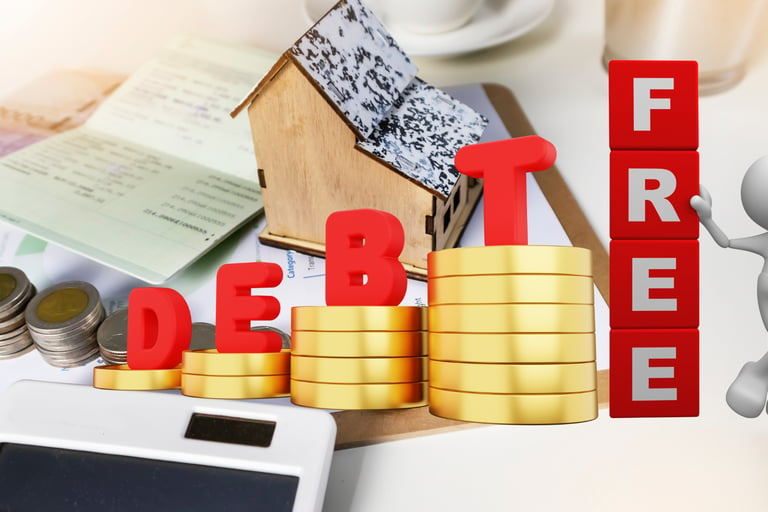How to Get Rid of Loans Using Real Estate
In today’s world, loans have become a part of almost everyone’s life. Whether it’s a home loan, car loan, personal loan, or business loan — monthly EMIs often take away a big part of our income. The real challenge comes when multiple loans start affecting financial stability. But what if you could use one of the most reliable wealth-building tools — real estate — to reduce and eventually eliminate your loan burden?
flixahdevelopers
11/3/20254 min read


How to Get Rid of Loans Using Real Estate
In today’s world, loans have become a part of almost everyone’s life. Whether it’s a home loan, car loan, personal loan, or business loan — monthly EMIs often take away a big part of our income. The real challenge comes when multiple loans start affecting financial stability. But what if you could use one of the most reliable wealth-building tools — real estate — to reduce and eventually eliminate your loan burden?
Yes, real estate can not only help you become debt-free faster but also create long-term financial stability. Let’s explore how.
1. Use Rental Income to Pay EMIs
One of the smartest ways to reduce your debt is to let your property pay for itself. By investing in an income-generating property, such as a flat, shop, or small commercial space, you can earn monthly rental income that covers your EMI payments.
For example, if your monthly EMI is ₹20,000 and you rent out your property for ₹18,000 to ₹25,000 per month, your asset is practically self-sustaining. Over time, as rent increases and your EMI remains constant (for fixed-rate loans), you’ll start generating extra income.
After your loan tenure ends, you will own a debt-free property that continues to provide a steady monthly cash flow. This is how real estate turns from a liability into a wealth-creating asset.
2. Leverage Property Appreciation to Clear Loans
Real estate values generally increase over time, especially in developing or high-demand areas. If you invest strategically, the appreciation in your property’s value can become a powerful tool to reduce or clear your existing debts.
Suppose you buy a plot worth ₹20 lakh in a developing area. After 5–7 years, its market value might rise to ₹40–45 lakh. You can either sell that property and use the profit to repay your high-interest loans, or take a loan against the appreciated property at a lower interest rate to clear your costly debts.
This way, you’re not only using your real estate investment as an appreciating asset but also as a financial lever to restructure your debt in a smarter way.
3. Refinance or Consolidate Debt Using Property Value
If you own property with significant equity (value minus loan balance), you can use it to refinance your existing loans at better interest rates.
For example, if you have multiple loans — a personal loan, a vehicle loan, and a credit card debt — you can take a loan against property (LAP) to consolidate them into a single, low-interest loan. This helps in:
Reducing your overall interest payments
Simplifying EMI management
Freeing up monthly cash flow
A secured loan against real estate is usually cheaper than unsecured loans like credit cards or personal loans. This method can save you lakhs in interest over time.
4. “House Hacking” – Live Smart, Pay Less
House hacking is a concept that’s gaining popularity among young homeowners. It simply means using part of your own home to generate income.
If you own a duplex, 3BHK apartment, or house with extra space, you can rent out one floor or even a single room. The rental income can go directly toward your home loan EMI, reducing your monthly out-of-pocket expense.
For example, renting out one portion of your house for ₹10,000–₹15,000 per month could easily take care of a large portion of your EMI. Over a few years, this consistent income can help you pay off your loan much faster while keeping ownership of the entire property.
5. Invest in Real Estate Flipping (With Caution)
Another approach to getting rid of loans is through real estate flipping — buying undervalued properties, renovating them, and selling them for a profit.
If done correctly, the profit from one or two successful deals can be enough to clear your existing loans or make lump-sum prepayments.
However, flipping requires:
Good knowledge of the local market
Strong negotiation and renovation skills
Patience and timing
It’s not for everyone, but for investors who understand the market, flipping can be a high-reward strategy for debt reduction and wealth creation.
6. Use Real Estate as Collateral for Productive Purposes
Instead of taking high-interest personal or business loans, you can use your property as collateral to borrow funds at a lower rate. This allows you to replace high-cost debt with low-cost debt.
For example, if you have a 15% interest personal loan, you could take a loan against your property at 9–10% interest and use that money to clear the personal loan. You’ll save a significant amount on interest every month, making it easier to become debt-free faster.
7. Sell Non-Performing Assets
Sometimes, holding on to too many properties can tie up your capital unnecessarily. If you own a property that doesn’t generate income or appreciate much, consider selling it and using the funds to repay loans.
This doesn’t mean you’re giving up on real estate — you’re simply restructuring your portfolio to focus on income-generating or high-growth assets.
Smart investors always balance between liquidity and long-term gains.
The Long-Term Benefits of Real Estate Investments
Even after your loans are cleared, real estate continues to serve you in multiple ways. Here’s why it remains one of the best financial decisions you can make:
1. Passive Income for Life
Once your loan is paid off, rental income becomes pure profit. This can help you cover daily expenses, support your retirement, or invest in other ventures without financial pressure.
2. Hedge Against Inflation
As the cost of living rises, property prices and rents usually rise too. This means real estate naturally protects you against inflation.
3. Emergency Financial Backup
In times of financial crisis, your property acts as a safety net. You can mortgage or sell it to access immediate funds instead of falling back into high-interest debt.
4. Legacy and Family Security
Real estate is one of the best ways to create intergenerational wealth. Even after you’re gone, your family can benefit from the property’s value and income potential.
Final Thoughts
Real estate isn’t just about owning land or buildings—it’s about creating financial freedom. Whether you use rental income to pay EMIs, leverage property appreciation, or refinance loans against property value, your real estate portfolio can work as a powerful ally in becoming debt-free.
With a well-thought-out plan, real estate can help you transform liabilities into assets and turn your debt into long-term wealth. The key is to start small, stay consistent, and invest smartly in areas with strong growth potential.
If managed wisely, your property can not only help you get rid of loans but also ensure financial independence and security for life.
for more info on real estate investment please visit our website flixahdeveloperspvtltd.com and you can also reach us at +91 9100600730


